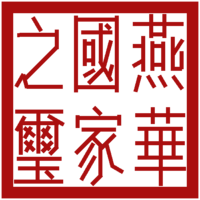Sendou: Difference between revisions
Philimania (talk | contribs) (Created page with "{{wip}} {{Infobox religion | name = Sendou<br><small>''神道<br>San4 dou6</small>'' | native_name = | image = Sendou symbol.png | imagewidth = | alt = | caption = TBA is widely considered the ''de facto'' symbol of Sendouism. | main_classification = West Abarian religions | scripture = ''Book of Dou'' | theology = {{wp|Animistic}} and {{wp|Polytheistic}} | area...") |
Philimania (talk | contribs) mNo edit summary |
||
| Line 14: | Line 14: | ||
| separated_from = [[Religion in pre-Sendou Yingok|Yinese animism]] | | separated_from = [[Religion in pre-Sendou Yingok|Yinese animism]] | ||
| separations = X | | separations = X | ||
| number_of_followers = c. 380 million {{increase}} | | number_of_followers = c. 380 million {{increase}} (2022)<ref>{{Cite journal|title=2022 Report on the Size of Sendou|journal=Journal of Religion|date=2022}} Retrieved 21 March 2023.</ref> | ||
}} | }} | ||
'''Sendou''' ({{wp|Cantonese|Yinese}}: ''神道'', [[Jinping]]: ''San4 dou6''), also known as '''Sendouism''' is a {{wp|religion}} originating from [[Yingok]] variously characterised by its {{wp|philosophy}} of living in harmony with {{wp|Nature religion|nature}} through worshipping supernatural entities believed to inhabit all things. Sendouist ideology has informed the development of various practices within the tradition of Yingok and beyond, including forms of {{wp|meditation}} and {{wp|astrology}}. There is no central authority in control of Sendou, with much diversity of belief and practice evident among practitioners. | '''Sendou''' ({{wp|Cantonese|Yinese}}: ''神道'', [[Jinping]]: ''San4 dou6''), also known as '''Sendouism''' is a {{wp|religion}} originating from [[Yingok]] variously characterised by its {{wp|philosophy}} of living in harmony with {{wp|Nature religion|nature}} through worshipping supernatural entities believed to inhabit all things. Sendouist ideology has informed the development of various practices within the tradition of Yingok and beyond, including forms of {{wp|meditation}} and {{wp|astrology}}. There is no central authority in control of Sendou, with much diversity of belief and practice evident among practitioners. | ||
Sendou is a {{wp|polytheistic}} and {{wp|animistic}} religion centered around the veneration of a vast [[Yinese mythology|pantheon of dieties and supernatural entities]] known as ''sens'' (神). These ''sens'' are believed to inhabit and symbolise various many things such as {{wp|river}}s, {{wp|mountain}}s, and {{wp|paddy field}}s. Worship of the ''sens'' typically takes place in household shrines, family shrines, and public temples. The latter are managed by {{wp|priest}}s who oversee offerings of food and drink to the specific ''sens'' enshrined at their location, aiming to cultivate harmony between {{wp|human}}s and the ''sens'' and to seek their blessings. Common rituals in Sendou include dances, {{wp|rites of passage}}, and seasonal festivals. Public shrines also provide divination services and religious objects such as amulets to adherents. Sendou places significant emphasis on ensuring purity, primarily through cleaning practices such as ritual washing and bathing, especially before worship. The religion places little emphasis on specific moral codes or particular beliefs about the afterlife, though the dead are considered capable of becoming ''sens''. | |||
==References == | |||
{{reflist}} | |||
{{yingoktopics}} | {{yingoktopics}} | ||
[[Category:Yingok]][[Category:Religion]] | [[Category:Yingok]][[Category:Religion]] | ||
Revision as of 19:13, 28 May 2024
This article is incomplete because it is pending further input from participants, or it is a work-in-progress by one author. Please comment on this article's talk page to share your input, comments and questions. Note: To contribute to this article, you may need to seek help from the author(s) of this page. |
| Sendou 神道 San4 dou6 | |
|---|---|
 TBA is widely considered the de facto symbol of Sendouism. | |
| Classification | West Abarian religions |
| Scripture | Book of Dou |
| Theology | Animistic and Polytheistic |
| Region | Yingok, X |
| Language | Old Yinese |
| Separated from | Yinese animism |
| Separations | X |
| Number of followers | c. 380 million |
Sendou (Yinese: 神道, Jinping: San4 dou6), also known as Sendouism is a religion originating from Yingok variously characterised by its philosophy of living in harmony with nature through worshipping supernatural entities believed to inhabit all things. Sendouist ideology has informed the development of various practices within the tradition of Yingok and beyond, including forms of meditation and astrology. There is no central authority in control of Sendou, with much diversity of belief and practice evident among practitioners.
Sendou is a polytheistic and animistic religion centered around the veneration of a vast pantheon of dieties and supernatural entities known as sens (神). These sens are believed to inhabit and symbolise various many things such as rivers, mountains, and paddy fields. Worship of the sens typically takes place in household shrines, family shrines, and public temples. The latter are managed by priests who oversee offerings of food and drink to the specific sens enshrined at their location, aiming to cultivate harmony between humans and the sens and to seek their blessings. Common rituals in Sendou include dances, rites of passage, and seasonal festivals. Public shrines also provide divination services and religious objects such as amulets to adherents. Sendou places significant emphasis on ensuring purity, primarily through cleaning practices such as ritual washing and bathing, especially before worship. The religion places little emphasis on specific moral codes or particular beliefs about the afterlife, though the dead are considered capable of becoming sens.
References
- ↑ "2022 Report on the Size of Sendou". Journal of Religion. 2022. Retrieved 21 March 2023.
